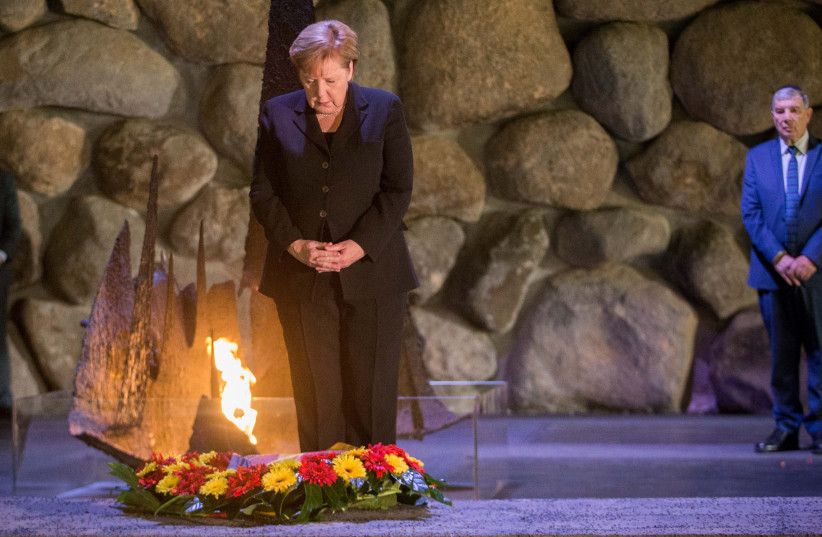The scheduled arrival on Sunday of outgoing German Chancellor Angela Merkel is a textbook case of the visit being the message.
As a lame-duck chancellor – Merkel did not stand for a fifth term in the September elections in which her center-right Christian Democrat party (CDU/CSU) was narrowly defeated by the center-left Social Democrats (SDP) – there is no pressing political or diplomatic reason for her visit.
Though it is unclear who exactly will be able to form a government and replace her, the SPD’s Olaf Scholz or perhaps the CDU’s Armin Laschet, it is certain that the German chancellor is not coming to Israel to launch any last-minute policy or diplomatic initiatives that may or may not be backed by her successor or the German government still in the making.
No, Merkel is not coming here for policy reasons, but rather for symbolic ones. That Merkel wants to make an eighth and final visit here as German chancellor, and that she will make one final visit in this capacity to Yad Vashem, shows the importance she attributes to the German-Israeli relationship.
And that is a message that is more important for the German public than the Israeli one.

While neither of the two likely candidates to form a government and succeed Merkel represents a generational change in German leadership – Scholz is 63 and Laschet is 60, while Merkel is 67 – a generational shift can be seen in the Bundestag.
According to a New York Times story, whereas only one in seven of the outgoing members of the German parliament is under 40, one in three of the 735 members voted into parliament in September was born after 1981. And that does represent a generational shift.
What that means for Israel is that as German parliamentarians get younger, their commitment to Israel’s security as a result of Germany’s responsibility for the Holocaust is likely to be considerably less than it has been for Merkel and her generation, for whom the Holocaust and the Third Reich are fresher memories.
Merkel famously was the first German chancellor to address the Knesset in 2008 and declared that Germany’s responsibility for Israel’s security was part of its raison d’être [staatsräson]. A decade later, in another visit to Jerusalem, she said that Germany is committed to “everlasting responsibility” to Israel “due to the crimes of the Holocaust.”
As the memory of the Holocaust fades, one wonders whether the younger generation of Germans – the ones who will rule the country in 10, 15 and 20 years hence – share those sentiments.
This is why Merkel’s swan-song visit to Israel is so significant. It sends a message that those sentiments should remain at the core of German foreign policy, and serves as a reminder to Germany of the vital importance to the country of upholding that relationship.
MERKEL WAS not the first German chancellor to feel a special responsibility to Israel because of the Holocaust, and it is a responsibility that all chancellors have articulated to some degree. But, except for the first chancellor of the republic, Konrad Adenauer, none have felt that responsibility more than Merkel.
This did not mean that she backed everything that Israel did. She did not, and her opposition to Israel’s settlement policies and to its position on Iran caused considerable friction with former prime minister Benjamin Netanyahu.
But she did not let that friction or those disagreements get in the way of providing crucial security assistance to Israel and important diplomatic cover at key junctures.
The Israeli public has grown accustomed to this type of support and has even come to take it almost as a given.
It is taken almost as a given by many that Germany will provide Israel with critical military hardware at huge discounts, from Dolphin-class submarines, believed pivotal for Israel’s second-strike ability, to naval patrol boats.
It is taken almost as given that the two governments will meet at regular intervals, alternating between holding joint cabinet meetings in Jerusalem and Berlin, to look for ways to further deepen the bilateral relationship.
And it is taken almost as a given that Germany is one of the countries Israel turns to when it needs help fending off hostile moves inside the EU or the UN. It is all taken as a given because it has been that way for so long.
But it is not a given and should not be seen as one.
Diplomatic relations, for the most part, are based on interests. Israel’s new relations with the United Arab Emirates, Bahrain and Morocco and the ties that flourished over the last decade with several African and Latin American states, as well as China and India, were based on interests; on what we could do for them, and what they could do for us.
In certain rare cases, however, diplomatic relations are also built on sentiment. This is true of the US-Israel relationship, a relationship which – though there are many common interests – has also traditionally been set on a solid bedrock of public pro-Israel sentiment that has to do with history, shared values and American religious beliefs.
Sentiment has also been the key ingredient of the German-Israeli relationship, with Germany feeling a special responsibility for the Jewish state’s security because of the Holocaust.
But as generations pass, sentiments change. Israel may well be facing that situation now with Germany, and – as some voices in the US Democratic Party now indicate – shifting sentiment in the US as well.
Which does not necessarily mean disaster. What it does mean, however, is that Israel will need to work hard to cultivate common interests, to demonstrate to a new generation of Germans why the Jewish state is important to them and what it has to offer. The government, during Merkel’s final visit here, should devote time to sounding her out about ways she thinks this could best be done.
